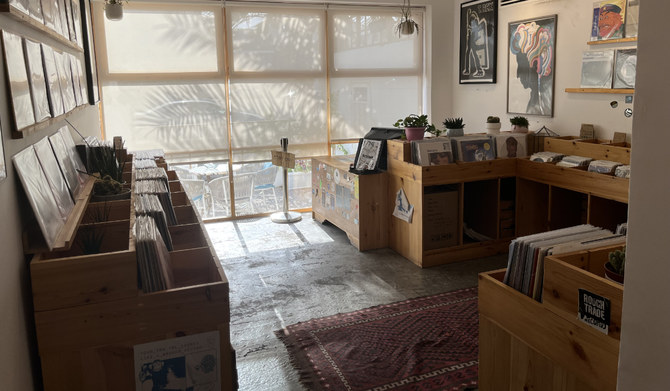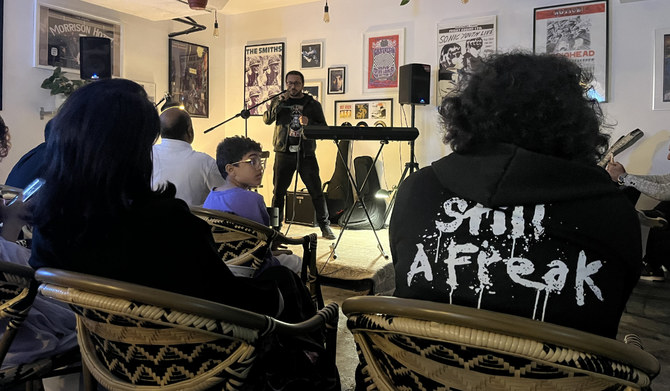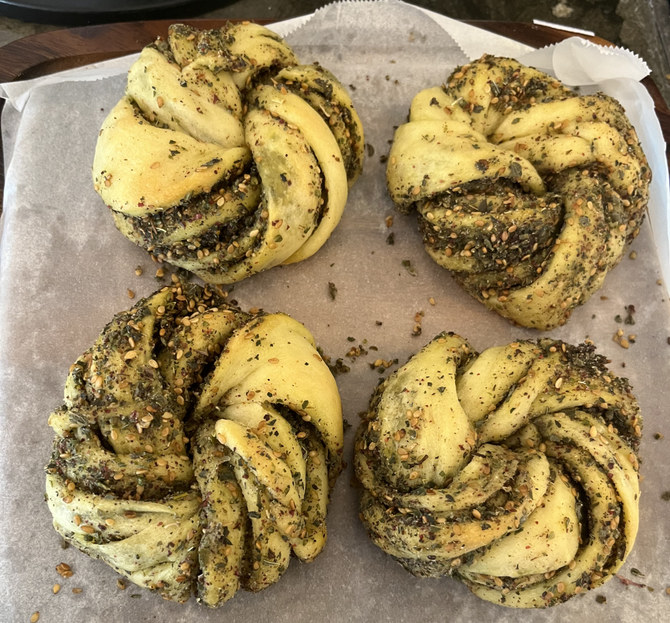ALKHOBAR: The new Bohemia Cafe is unlike any other in the area. It looks like you just pulled up to your cool friend’s house, with a small, serene garden path that leads to a well-curated space, ready to whisk you in, to have a fresh cup of strong coffee as music plays in the background.
Opened in early 2023, this iteration is a more cozy and grown-up version of the original Bohemia Cafe.
The first branch, which opened in 2018, was situated in a bustling part of the city and had an earthy vibe with a tinge of fun and funky. But the all-glass space, facing traffic in a commercial building, was plagued by limited parking spaces and did not fully fit the Bohemian energy.
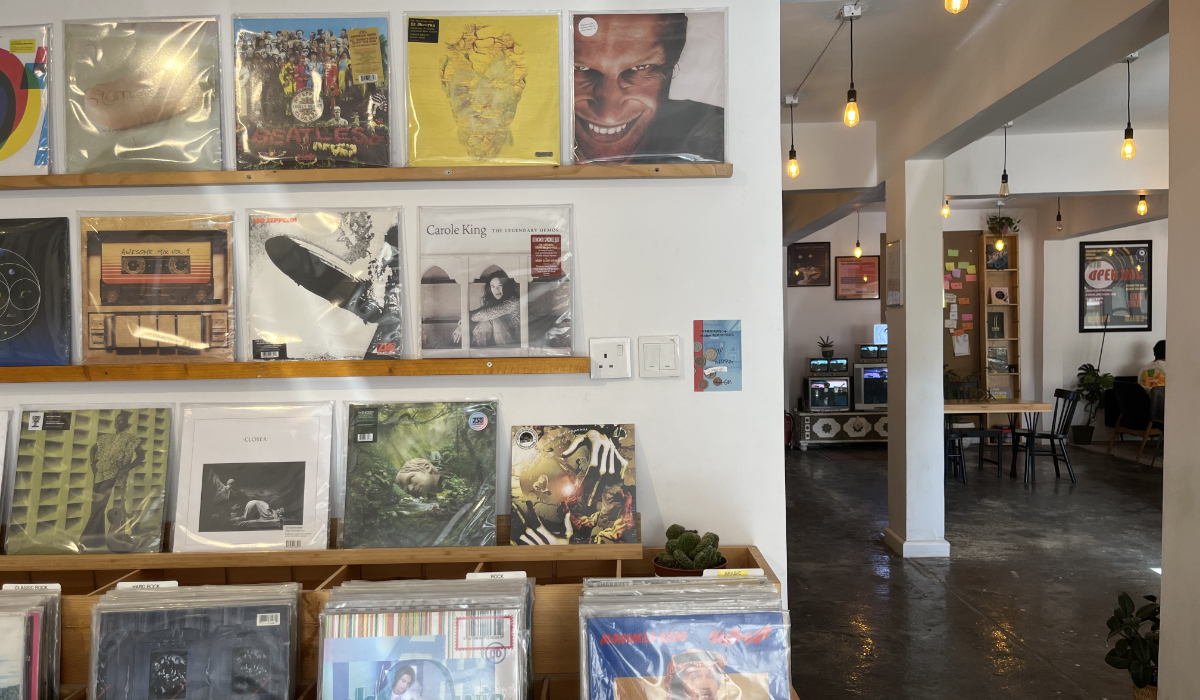
The hybrid cafe, which is one of the singular places to buy and sell vinyl records in the area. (AN photos)
When the old space shuttered, the music scene in Alkhobar lost a communal hub in which sonic synergies merged.
But with this new location, in the sleepy historic northern Alkhobar area, it seemed more their speed. It has stayed close to its roots in Alkhobar but evolved into being a quaint, house-type standalone, where there is a sizable front yard and plenty of seating indoors and out.
The hybrid cafe, which is one of the singular places to buy and sell vinyl records in the area, has become a sort of off-the-beaten-path sanctuary where the artsy types in the area can come together to enjoy music while sipping on one of the cafe’s beverages, and snacking on the homemade pastries on sale.
HIGHLIGHTS
• It is perhaps one of the few venues that welcome all levels of talent, and certainly one of the rare ones that offer the chance for amateurs to perform.
• Most who come to Bohemia on their live performance nights — which include ones dedicated to certain singers or open mics — can expect the unexpected.
In contrast to the flashy Riyadh and fancy Jeddah venues, especially with the success of music festivals such as XP and MDLBEAST in both cities, quaint Alkhobar has always been more niche, and definitely an off-the-radar city.
The east coast has long enjoyed a culture that is steeped in a more laid-back lifestyle. Bohemia Cafe refers to itself as “an independent music record store and cafe in Alkhobar” but it is more than that. It is the heartbeat of local music lovers, and quintessentially Alkhobar.
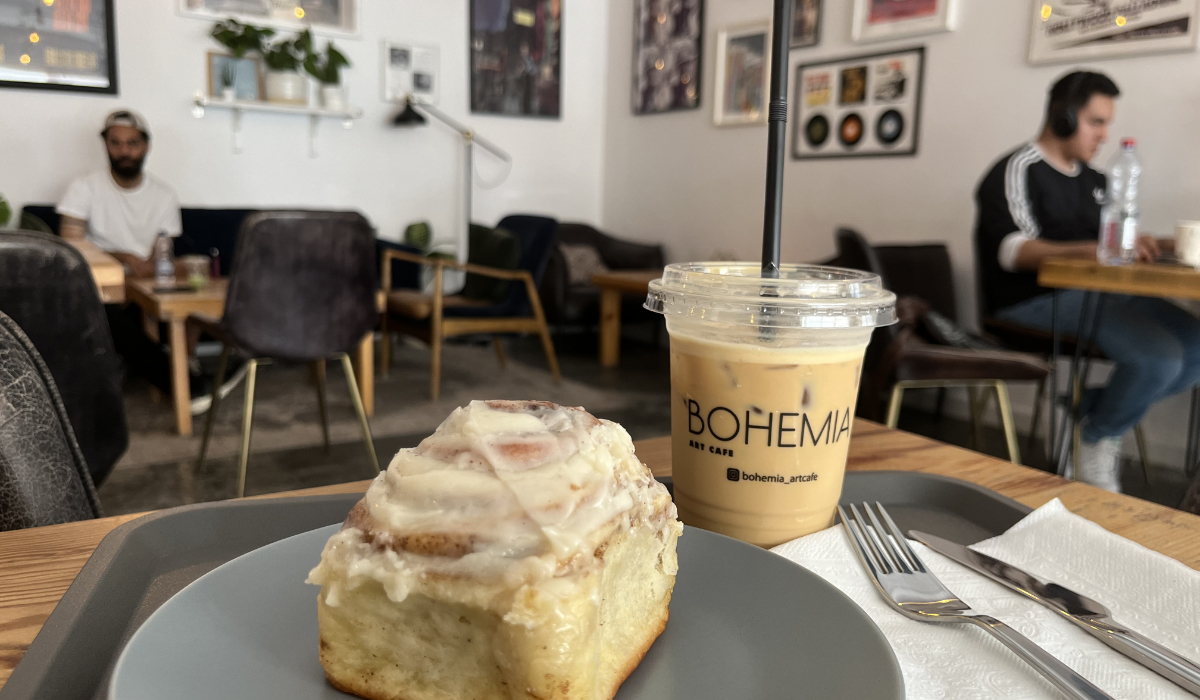
Bohemia Cafe is the heartbeat of local music lovers, and quintessentially Alkhobar. (AN photos)
It is perhaps one of the few venues that welcome all levels of talent, and certainly one of the rare ones that offer the chance for amateurs to perform. Most who come to Bohemia on their live performance nights — which include ones dedicated to certain singers or open mics — can expect the unexpected. Like a mixtape, the night is a mixed bag: some will masterfully play instruments, while others shout out words and move around with a mic in hand. The community seems to transcend time and space.
Before any open mic at Bohemia, a notice is posted days in advance on social media and interested artists can direct-message to sign up. Those who wish to simply sip a beverage and watch need to buy a ticket, usually between SR75 ($20) and SR100. This can be used as credit in the store on the day of the show, to buy music or something else.
Fatima, who identifies as an artist, loves the aesthetic of the cafe but most of all the way local talents are showcased in such a safe and fun environment.
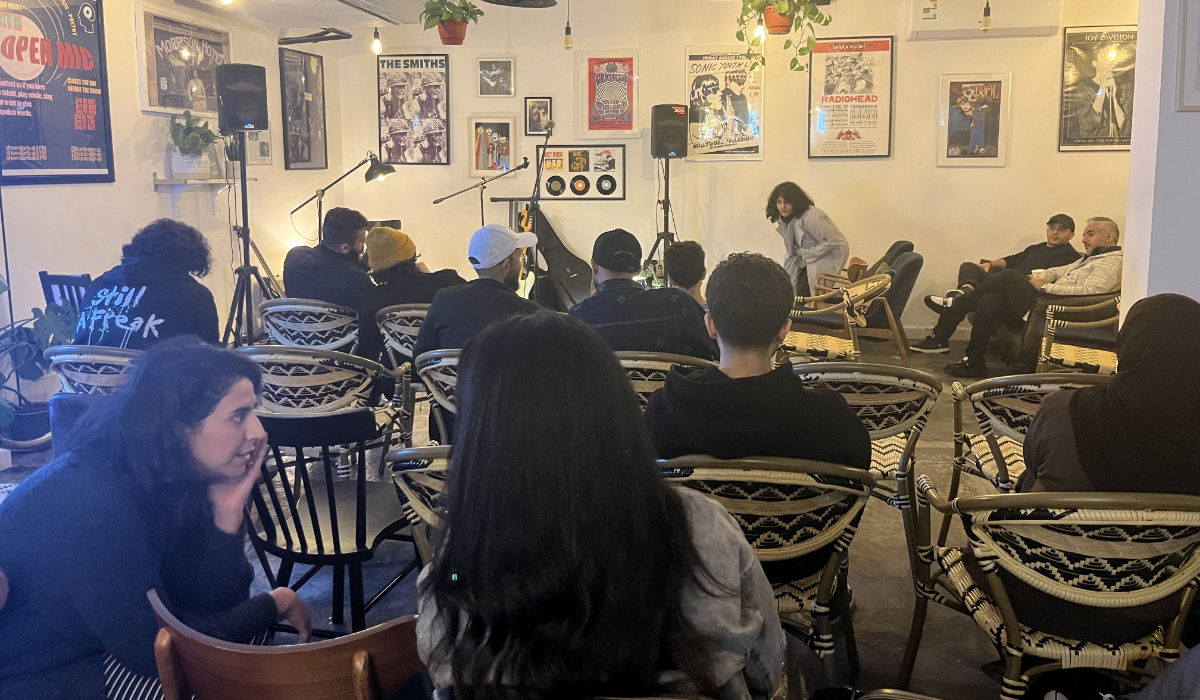
Bohemia Cafe is the heartbeat of local music lovers, and quintessentially Alkhobar. (AN photos)
As the winter nights become long, she relishes spending her evenings in the space, cradling a warm drink and experiencing a sense of wonder. Every time she visits, she is giddy about the prospect of listening to familiar voices and discovering new ones.
“Bohemia has significantly provided us with something that other coffee shops don’t — live music,” Fatima, who has been to several open mics, told Arab News.
“Each live show has its own vibe; the diversity of bands, the chosen genres and targeted audience tells a lot about how much everyone in this place shares one standing thing in common — their passion for music,” she said.
And, indeed, music is what brings — and what keeps — people coming back.
Dana, who goes by the stage name “Farasha” which is Arabic for butterfly, stumbled upon the cafe, serendipitously, on a karaoke night at the old Bohemia. The exhilarating experience helped her spread her wings.
“It happened by mistake. I once attended a karaoke night in either 2021 or 2022 — at the old branch — and I watched people sing karaoke. I did not sign up. And I was like, I want to hold the mic. So I did,” she told Arab News.
Her sisters and friends, who were with her, encouraged her to step up and go for it. She stood up and belted out a popular tune “Hit the road, Jack,” because she knew the band on hand would know how to play it. Many sang along. She had fun. While performing, she said that she channeled her idol, Hannah Montana, a fictional character on a popular Disney show, who is a regular teen but also a huge pop star on the side.
“I want to rock out, too,” Farasha said.
In late November, she performed several songs at the most recent open mic. With a crisp voice and quiet confidence, her hands fluttered gracefully as she hit the notes. And, when she occasionally forgot some of the lyrics, the crowd filled in the blanks and joined her in unison.
“The first time I performed, I was really nervous. My sisters were so encouraging. People were cheering. And then Fawaz, the owner, reached out to me to perform later; I did a quick session at Ladies Night. It was a great experience. So today wasn’t my first time; it was I believe, my third or fourth time,” she said.
She was referring to the ever-present but never overbearing owner Fawaz Alsulaim. If ever a figure encapsulated the essence of the old and new Bohemia Cafes, it is the owner.
Alsulaim, who could be described as a quiet but not shy millennial, often sits calmly, exuding wisdom and, perhaps, inner peace. He is approachable but also elusive. During the aforementioned open mic, he strategically sat in a corner with the best vantage point, throwing reassuring nods to performers but barely going into the spotlight at all. With his calm demeanor and sharp eye — and ear — for talent, he is simply there to spot potential and to foster it.
“We discovered so many talents, so many people who didn’t even consider pursuing music careers or performing — they did their first gig here, either at an open mic or with just an acoustic guitar or even doing it karaoke style,” Alsulaim told Arab News with a smile. “Them getting the rush of performing live — so, so many people started their music careers this way,” he proudly said.
If you want to sing but feel nervous, Alsulaim would be there to offer words of encouragement but never pressure.
Some who choose to go on stage are seasoned professionals, while others had previously only performed with their hairbrushes in their bedrooms.
On the day of our visit, a young woman with a baseball cap and face half-covered in a mask came on stage. She said that it was her first time singing in front of an audience and asked if people would humor her and respectfully not photograph or film her performance. During the entirety of her time on stage, no one held up a phone. Everyone just watched, sang along when she prompted, and clapped for her.
Some performers are armed with original songs, in English or Arabic. What is evident is that it is a place where experimentation is welcome. As long as you have the guts to step up to the mic, people will listen.
On average, about a dozen people sign up to perform, with around half usually first-timers.
“Everyone is always welcome to perform here, whatever they want. If they want to sing, we never turn anyone away,” Alsulaim told Arab News.
Alsulaim was true to his word when Arab News visited. After the final act was announced, people started to leave. But someone casually singled out a person in the front row, who had been nodding and clapping along all night. He gladly went to the stage for a song. Then two, then three. Many who were leaving sat down.
The performer was none other than Nader Al-Fassam, a local legend in the Alkhobar underground since the 1990s, and has been a regular on the scene and at Bohemia specifically. He is at ease singing well-known top-40 hits as well as more obscure favorites. He often performs his own original music.
“I wasn’t supposed to perform tonight but somebody didn’t show up so I was kind of pushed to take his place,” he told Arab News after his set.
A staple at music-focused celebrations in the area, Al-Fassam is perhaps the perfect encapsulation of the old and new Bohemia. He is the lead guitarist with the Saudi Arabia psychedelic punk band, Sound of Ruby. Like Alsulaim, he is eager for the next generation of Eastern Province talents to step up and join the party.
Al-Fassam, before the grand finale of the Open Mic, announced to the crowd that he would celebrate his 50th birthday at Bohemia Cafe — because it hits all the right notes. Alsulaim gracefully nodded and everyone — presumably invited — erupted in wild applause.
Alsulaim’s clear joy derived from finding and celebrating local talent has become an endearing quality in the community.
When asked if he would be singing at the next show, or at Al-Fassam’s birthday party, Alsulaim shook his head playfully.
“I’m not a musician unfortunately, I just sell some music,” he responded.



